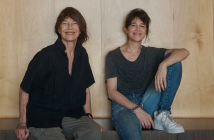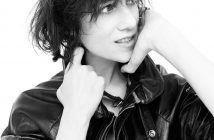Singer and actress Charlotte Gainsbourg takes us through the creation of ‘Rest,’ her disco-oriented album inspired by traumatic experiences.
Like many cinephiles, the first images my mind conjures when I think of Charlotte Gainsbourg are ones linked to her bravura performance in Lars von Trier’s devastating epic Melancholia. In her role as Claire, the actress displayed a proclivity for portraying the nuances of grief in a manner that felt radiant, demonstrating the ultimately transcendent power of suffering.
It is perhaps unsurprising then that Gainsbourg effortlessly produces the same effect with Rest, her years-in-the-making, fourth album proper in her storied music career. Life imitated art with this project, one that was largely inspired by the tragic death of her sister, photographer Kate Barry, in 2013.
“I had gone through a big trauma, which was my sister’s death” she begins quietly, perched on the edge of the well-manicured sofa of her hotel suite. “I left for New York, and once I got in, it was like an open book started. Something new. I didn’t care about people’s judgment or if… I wasn’t recognized. Nobody knew who I was. I was in that bubble that I created with my family over there. And it was only about family, just being the five of us, at last breathing again and discovering a new life that I was really longing for.”
Gainsbourg’s initial sketches for the album suddenly veered into an entirely new direction. Enter SebastiAn, the Ed Banger Records affiliate and recent Frank Ocean-collaborator, who worked closely with her over the course of the next year. “We got along quite quickly, but it was a very slow start. It took me a long time before we really engaged into a work that was coming together” she says of their work together, “he has this lovely spirit that is sometimes very grandiose and has that something I really related to.”
This new musical direction is starkly different from the sound of her last record, 2009’s IRM. That album was overseen and executive-produced by Beck, who brought his characteristic gritty-alt-rock to the proceedings. Rest, however, is a bona fide slice of neo-disco, with the title track even receiving a production job from Daft Punk’s Guy-Manuel de Homem-Christo.
Such an upbeat sound may seem a puzzling thing to pair a record about loss to, but Gainsbourg’s disco palette is one informed by a subject just as morose – horror films. “I’m always about childhood and memories and things that affected me when I was small. Those were horror films that I saw quite early on and that really marked me” she says of the album’s thematic influences. “And it went from Psycho to The Shining and Carrie and Jaws. Quite traumatic films where I loved the atmosphere and the violence. That was a real starting point.”
“I’ve always loved violent things,” she continued, “Violent scenes, when I had to play them. And I think violent music, because it’s so far away from not only the image that people have of me, but also because I have quiet voice. I can’t pretend that I’m different. For someone who’s a bit shy in nature, it was going to my own limits and trying to push the barriers – similar to the way that I work with Lars [von Trier]. For me, that’s the whole point. Maybe not in life, I’m not sure about that, but in work, definitely.”
And push herself she did. For the first time in her career, Gainsbourg wrote the lyrics herself. This may seem a basic tenet of songwriting for some, but for her, it meant finally reckoning with and stepping out from the long shadow cast by her father, the late icon Serge Gainsbourg. “He was too much of a hero for me, and I put him on a pedestal for so long that singing in French would have been just impossible.”
“I don’t believe I’m an author,” she begins after a period of reflection, “But for this moment, it’s the first time. I don’t really know what I sound like, what the lyrics sound like especially. I wasn’t scared about being personal. It’s an open dialogue to myself, to my sister, to my father. It’s really very personal in the way that I did it very selfishly. I did it because I wanted to express these things at the time, and I didn’t think of how people would respond or what they would get from that. It’s only now that I’m thinking what would people perceive.”
Her courage – and confidence – has paid off. One of the many remarkable elements that make Rest such an intriguing listen is the constant interplay between Gainsbourg singing in both English and French, itself mirroring the interplay of dark concepts with incredibly buoyant sounds. In playing with both languages, she is able to riff one off the other, making double meanings around every corner. The title of the album itself is a pun; “Rest, it means stay [in French]. And Rest means lying and the death. It’s not opposing forces, but it’s different meanings. I like that the fact that it doesn’t… It should not be together.”
In addition to processing the death of those around her, Gainsbourg deftly turns her gaze towards the land of the living. Chief amongst these subjects is herself, an idea brought to glorious, metaphysical life in the music video for the album’s title track. Self-directed, it finds the artist looking through a series of film clips, some of which are her own; her visage in the aforementioned Melancholia being studied by a Charlotte now six years older, riddled with a wholly new set of traumas.
I mention that for an album inspired by her real-life sister’s passing, it must surely be no coincidence that she turns back to one of her greatest screen roles as an overprotective sister. She seems startled by my admission; “I didn’t think of that,” she utters, “I hadn’t thought of it like that. I just have instincts, and I trust my instincts.” If the gorgeousness of Rest is anything to go by, she should never have any reason to doubt such instincts.



